Working with People with Mental Health Issues
Added on 2023-04-11
27 Pages6700 Words97 Views
Mental Health Issues 1
Working with People with Mental Health Issues
By (Student’s Name)
Name of the course
Instructor’s Name
Institutional Affiliation
Department
Date
Working with People with Mental Health Issues
By (Student’s Name)
Name of the course
Instructor’s Name
Institutional Affiliation
Department
Date
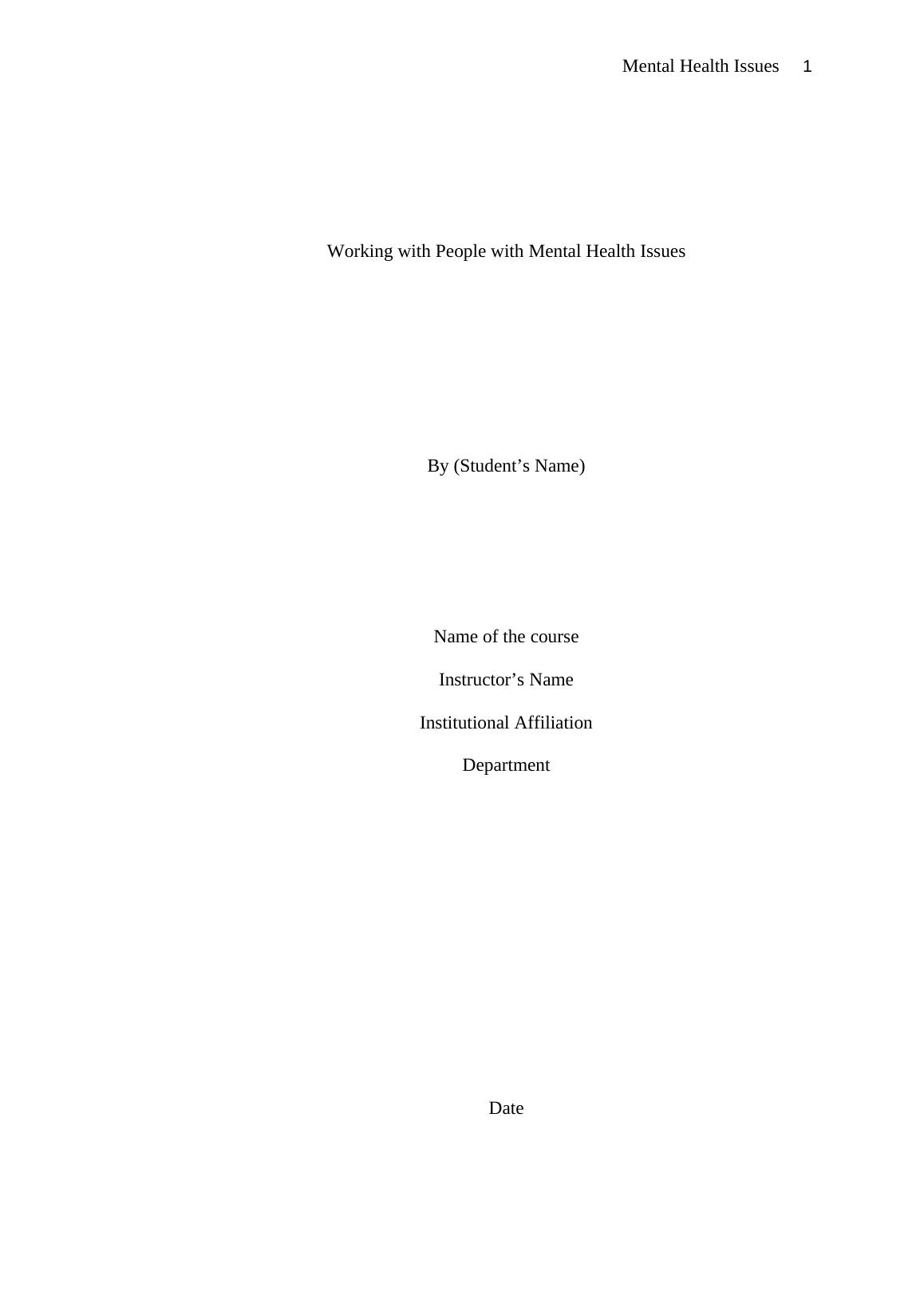
Mental Health Issues 2
Working with People with Mental Health Issues
Part 1: Questions
1. Define the key issues of prejudice and discrimination and explain how they
impact on people with mental health needs.
Prejudice refers to preconceived notions about a phenomenon that are not based
sound judgement. People have various preconceived notions about persons with
mental health needs. It is sad to note that most of these notions are negative in
nature. For instance, most people have a tendency of assuming that persons with
mental health needs are abnormal. This is not only saddening but also
disheartening. It is probably brought about by a lack of understanding of mental
illnesses and their nature. Discrimination refers to treating other people in a way
that is not just. People with mental health needs are discriminated in various ways.
For instance, people may tend to avoid them. This form of discrimination makes
them feel socially ostracized.
2. What is the principle of recovery as it relates to the mental health sector?
The principle of recovery refers to a model that is used to help people with mental
health needs to lead a fulfilling life. Most people with mental health believe that
their only role is shear survival. It encourages and supports them have hope and
lead a productive life. It is common for people with mental health issues to
assume that they are doomed since they do not have the capability of a person
with normal mental health (Worden, 2018). Due to this, they may remain at home
doing nothing and thinking that they have no option but to just exist. The principle
of recovery aims at ensuring that persons who are mentally ill are supported to
make a living. The principle emphasizes on various fundamental components.
Working with People with Mental Health Issues
Part 1: Questions
1. Define the key issues of prejudice and discrimination and explain how they
impact on people with mental health needs.
Prejudice refers to preconceived notions about a phenomenon that are not based
sound judgement. People have various preconceived notions about persons with
mental health needs. It is sad to note that most of these notions are negative in
nature. For instance, most people have a tendency of assuming that persons with
mental health needs are abnormal. This is not only saddening but also
disheartening. It is probably brought about by a lack of understanding of mental
illnesses and their nature. Discrimination refers to treating other people in a way
that is not just. People with mental health needs are discriminated in various ways.
For instance, people may tend to avoid them. This form of discrimination makes
them feel socially ostracized.
2. What is the principle of recovery as it relates to the mental health sector?
The principle of recovery refers to a model that is used to help people with mental
health needs to lead a fulfilling life. Most people with mental health believe that
their only role is shear survival. It encourages and supports them have hope and
lead a productive life. It is common for people with mental health issues to
assume that they are doomed since they do not have the capability of a person
with normal mental health (Worden, 2018). Due to this, they may remain at home
doing nothing and thinking that they have no option but to just exist. The principle
of recovery aims at ensuring that persons who are mentally ill are supported to
make a living. The principle emphasizes on various fundamental components.
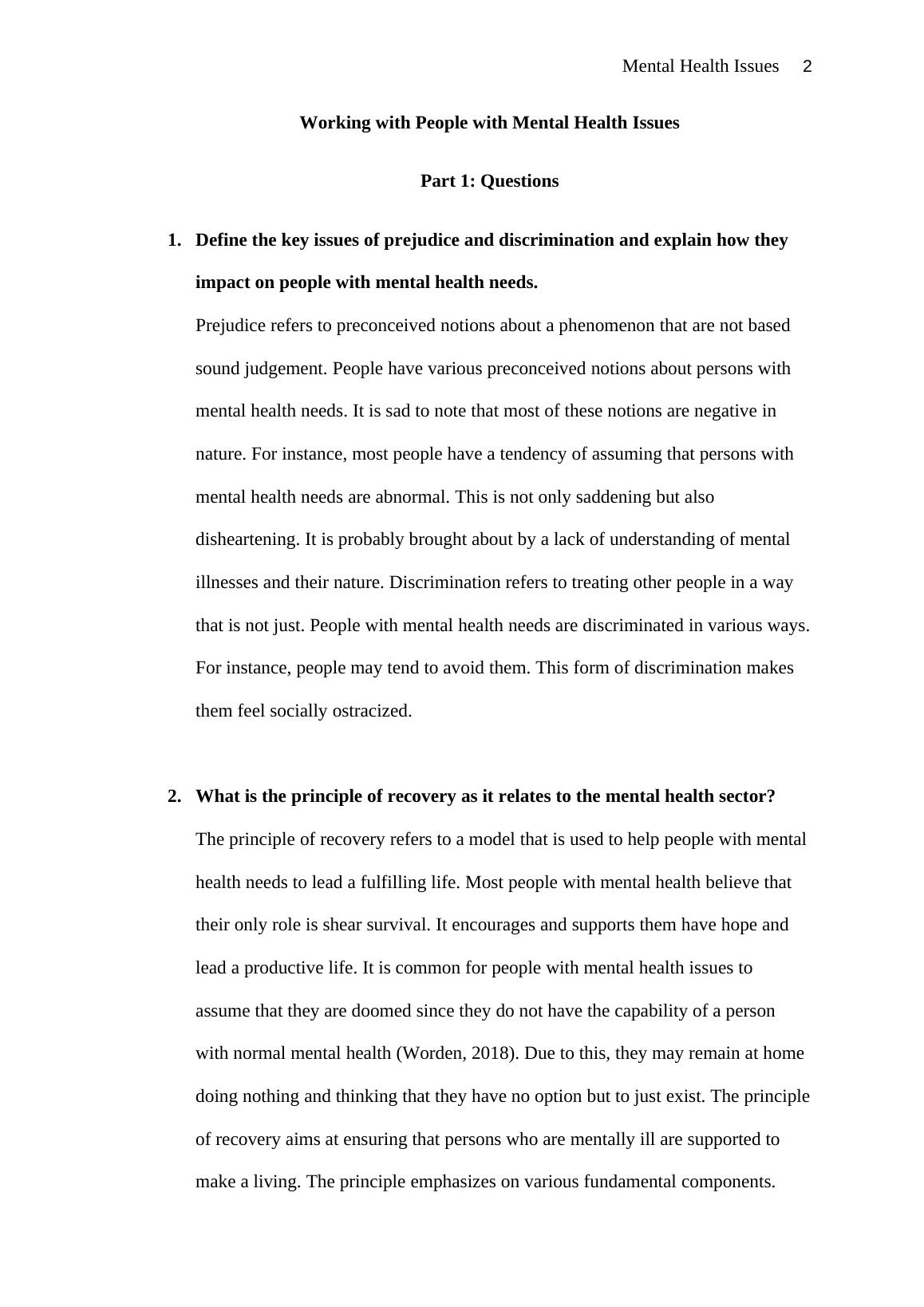
Mental Health Issues 3
These include empowerment, holistic living, peer support, respect and self-
direction.
3. Explain the principles of empowerment and disempowerment and what they
mean for a person with mental health needs.
The principle of empowerment refers to the measures that are put in place to
ensure that persons with mental illnesses are supported to live a holistic life. In
contemporary society, there are numerous such measures. These include
favourable laws, increased campaigns to end stigma and increased support from
both governmental and non-governmental agencies (Townsend and Morgan
2017). Due to this, most people are adopting positive attitudes towards people
with mental health illnesses. In addition, the mentally ill are receiving great care
and support. Disempowerment refers to discrimination towards the mentally ill.
Whereas most people have adopted positive attitudes towards people with mental
illnesses, discrimination and prejudice towards them is still prevalent in some
institutions and organizations. This shows that there is need for more
empowerment efforts. Hopefully, a day will come when every person will
appreciate that the mentally ill are just as human as everyone else.
4. What are the basic rights of people with mental health needs?
Persons with mental health needs are entitled to fair treatment. They should be
treated in a manner that is both respectful and dignified. Their privacy should be
protected. In some situations, especially where a mentally ill person is unable to
make any sound judgement, they are entitled to the following basic rights. It is the
role of the staff and providers of mental health services to ensure that these rights
These include empowerment, holistic living, peer support, respect and self-
direction.
3. Explain the principles of empowerment and disempowerment and what they
mean for a person with mental health needs.
The principle of empowerment refers to the measures that are put in place to
ensure that persons with mental illnesses are supported to live a holistic life. In
contemporary society, there are numerous such measures. These include
favourable laws, increased campaigns to end stigma and increased support from
both governmental and non-governmental agencies (Townsend and Morgan
2017). Due to this, most people are adopting positive attitudes towards people
with mental health illnesses. In addition, the mentally ill are receiving great care
and support. Disempowerment refers to discrimination towards the mentally ill.
Whereas most people have adopted positive attitudes towards people with mental
illnesses, discrimination and prejudice towards them is still prevalent in some
institutions and organizations. This shows that there is need for more
empowerment efforts. Hopefully, a day will come when every person will
appreciate that the mentally ill are just as human as everyone else.
4. What are the basic rights of people with mental health needs?
Persons with mental health needs are entitled to fair treatment. They should be
treated in a manner that is both respectful and dignified. Their privacy should be
protected. In some situations, especially where a mentally ill person is unable to
make any sound judgement, they are entitled to the following basic rights. It is the
role of the staff and providers of mental health services to ensure that these rights
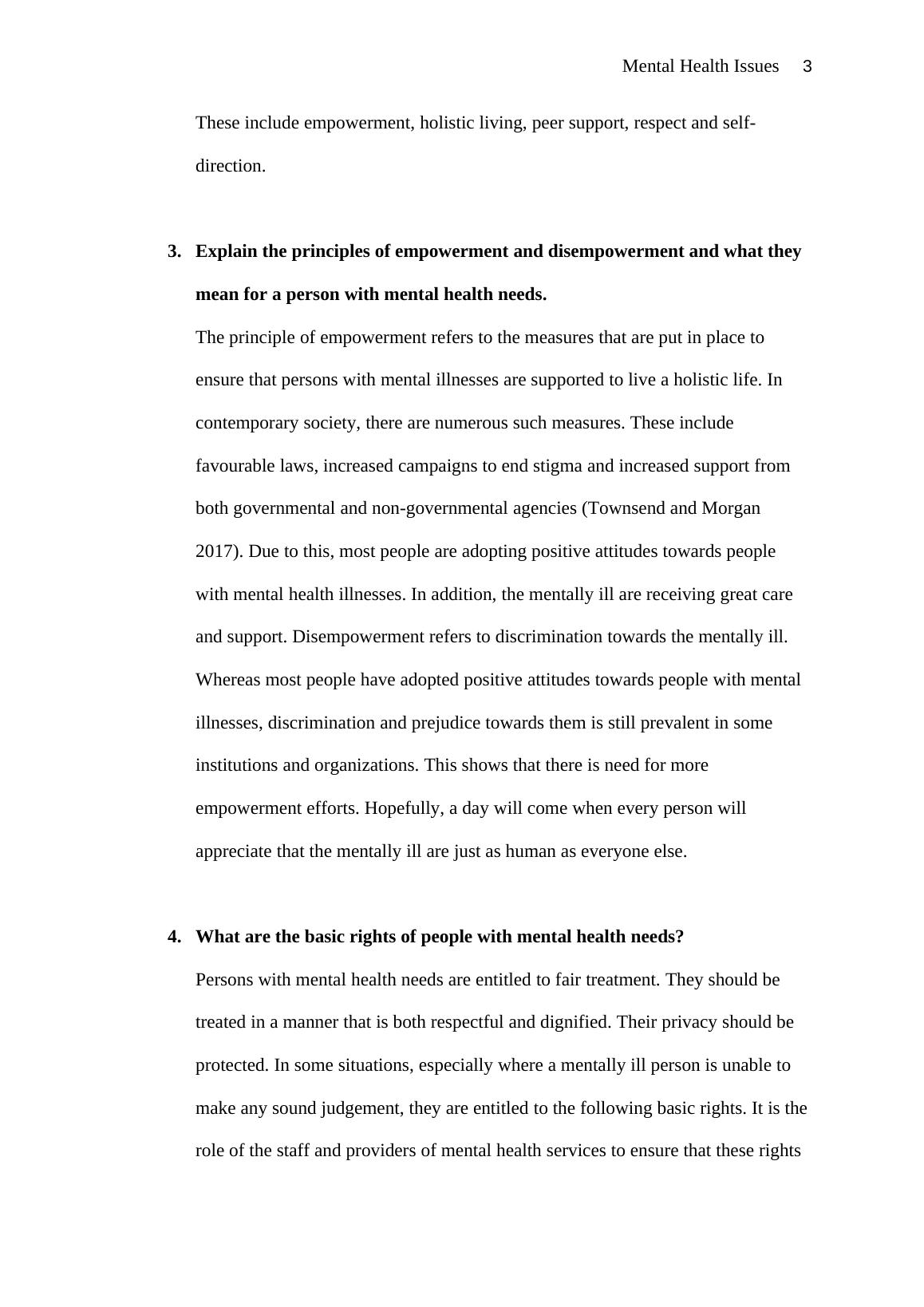
Mental Health Issues 4
are brought to effect. First, they should ensure that mentally ill people are
regularly cleaned (Wahlbeck, 2015). This is done to avoid leaving these people in
their waste for a long time. In addition, the mentally ill should be protected from
any form of physical or verbal abuse. In case any right is violated, the mentally ill
have a right to access the justice system through the help of the above-mentioned
staff.
5. How do the principles of access and equity apply to people with mental illness
who come from a variety of social, cultural and spiritual backgrounds?
Good mental health is important in every society. The principle of access refers to
the ability of a mentally ill person to receive good health and has an environment
that favours their wellbeing. Equity on the other hand refers to sharing of
resources according to need. Therefore, the mentally ill should be supported to
live in the best way possible. Mentally ill persons should be entitled to the
principles of access and equity without discrimination on the basis of social,
cultural or spiritual backgrounds. There are several ways through which these
principles could be made to have more effect. These include but are not limited to
increasing awareness, developing appropriate policies concerning mental health
and reducing discrimination. When policies are made, they should be
implemented. This would help improve the lives of the mentally ill.
6. Should a person’s citizenship status affect the principles of access and equity?
Why? Why not?
The citizenship status of a person should not affect the principles of access and
equity. Whether an individual is a refugee or a citizen of a country, they should be
are brought to effect. First, they should ensure that mentally ill people are
regularly cleaned (Wahlbeck, 2015). This is done to avoid leaving these people in
their waste for a long time. In addition, the mentally ill should be protected from
any form of physical or verbal abuse. In case any right is violated, the mentally ill
have a right to access the justice system through the help of the above-mentioned
staff.
5. How do the principles of access and equity apply to people with mental illness
who come from a variety of social, cultural and spiritual backgrounds?
Good mental health is important in every society. The principle of access refers to
the ability of a mentally ill person to receive good health and has an environment
that favours their wellbeing. Equity on the other hand refers to sharing of
resources according to need. Therefore, the mentally ill should be supported to
live in the best way possible. Mentally ill persons should be entitled to the
principles of access and equity without discrimination on the basis of social,
cultural or spiritual backgrounds. There are several ways through which these
principles could be made to have more effect. These include but are not limited to
increasing awareness, developing appropriate policies concerning mental health
and reducing discrimination. When policies are made, they should be
implemented. This would help improve the lives of the mentally ill.
6. Should a person’s citizenship status affect the principles of access and equity?
Why? Why not?
The citizenship status of a person should not affect the principles of access and
equity. Whether an individual is a refugee or a citizen of a country, they should be
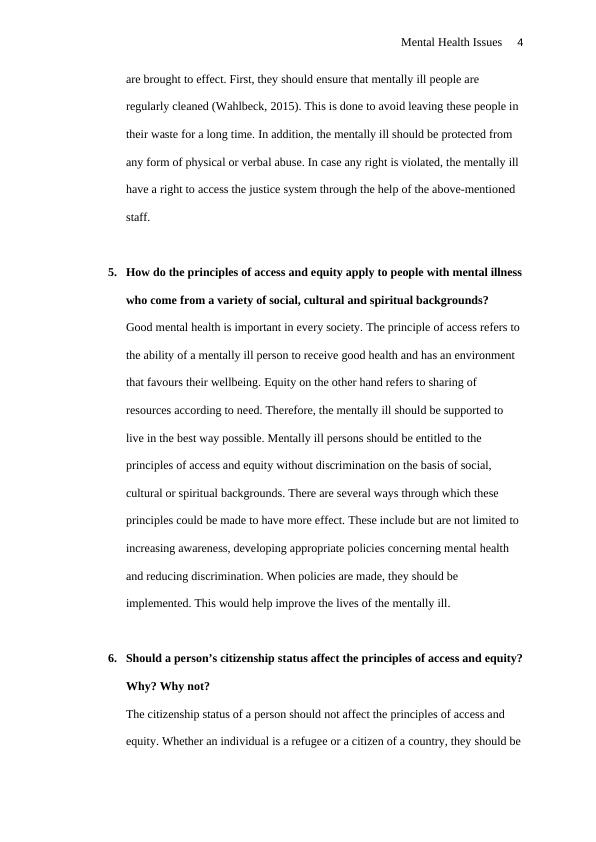
Mental Health Issues 5
entitled to the principles of access and equity. The United Nations Declaration for
Huma Rights stipulates that every person on the globe is entitled to the highest
attainable level of health care and wellbeing. In addition, every person should be
respected and treated with outmost dignity. Therefore, every person, should have
fair and equitable access to appropriate resources despite their citizenship status.
The rights for the mentally ill people should be observed and maintained despite
their citizenship status. If citizenship were to be considered, there is a high
likelihood that any person who is not a citizen may be discriminated against when
it comes to access and equity.
7. Briefly outline how attitudes to mental health and approaches to working
with people with mental illness have changed in a historical context.
Attitudes towards mental health have changed over the years. It is worth noting
that the changes have been mainly positive in nature. In the early times, mental
health illnesses were considered to be a result of curses or bad omens. Some
communities used to chase away people with these conditions for it was believed
that the ‘curse’ or ‘bad omen’ would spread to other members of the society. In
the modern society, this has changed. Modern medicine has helped establish the
causes/ risk factors for mental health illnesses (Orthwein, 2017). Stigma and
discrimination have greatly reduced. Approaches to working with people with
mental illnesses have also greatly changed over time. In the modern day, the
approach is evidence based. Traditionally, the main approach towards the
mentally ill was characterized by avoidance and discrimination.
entitled to the principles of access and equity. The United Nations Declaration for
Huma Rights stipulates that every person on the globe is entitled to the highest
attainable level of health care and wellbeing. In addition, every person should be
respected and treated with outmost dignity. Therefore, every person, should have
fair and equitable access to appropriate resources despite their citizenship status.
The rights for the mentally ill people should be observed and maintained despite
their citizenship status. If citizenship were to be considered, there is a high
likelihood that any person who is not a citizen may be discriminated against when
it comes to access and equity.
7. Briefly outline how attitudes to mental health and approaches to working
with people with mental illness have changed in a historical context.
Attitudes towards mental health have changed over the years. It is worth noting
that the changes have been mainly positive in nature. In the early times, mental
health illnesses were considered to be a result of curses or bad omens. Some
communities used to chase away people with these conditions for it was believed
that the ‘curse’ or ‘bad omen’ would spread to other members of the society. In
the modern society, this has changed. Modern medicine has helped establish the
causes/ risk factors for mental health illnesses (Orthwein, 2017). Stigma and
discrimination have greatly reduced. Approaches to working with people with
mental illnesses have also greatly changed over time. In the modern day, the
approach is evidence based. Traditionally, the main approach towards the
mentally ill was characterized by avoidance and discrimination.
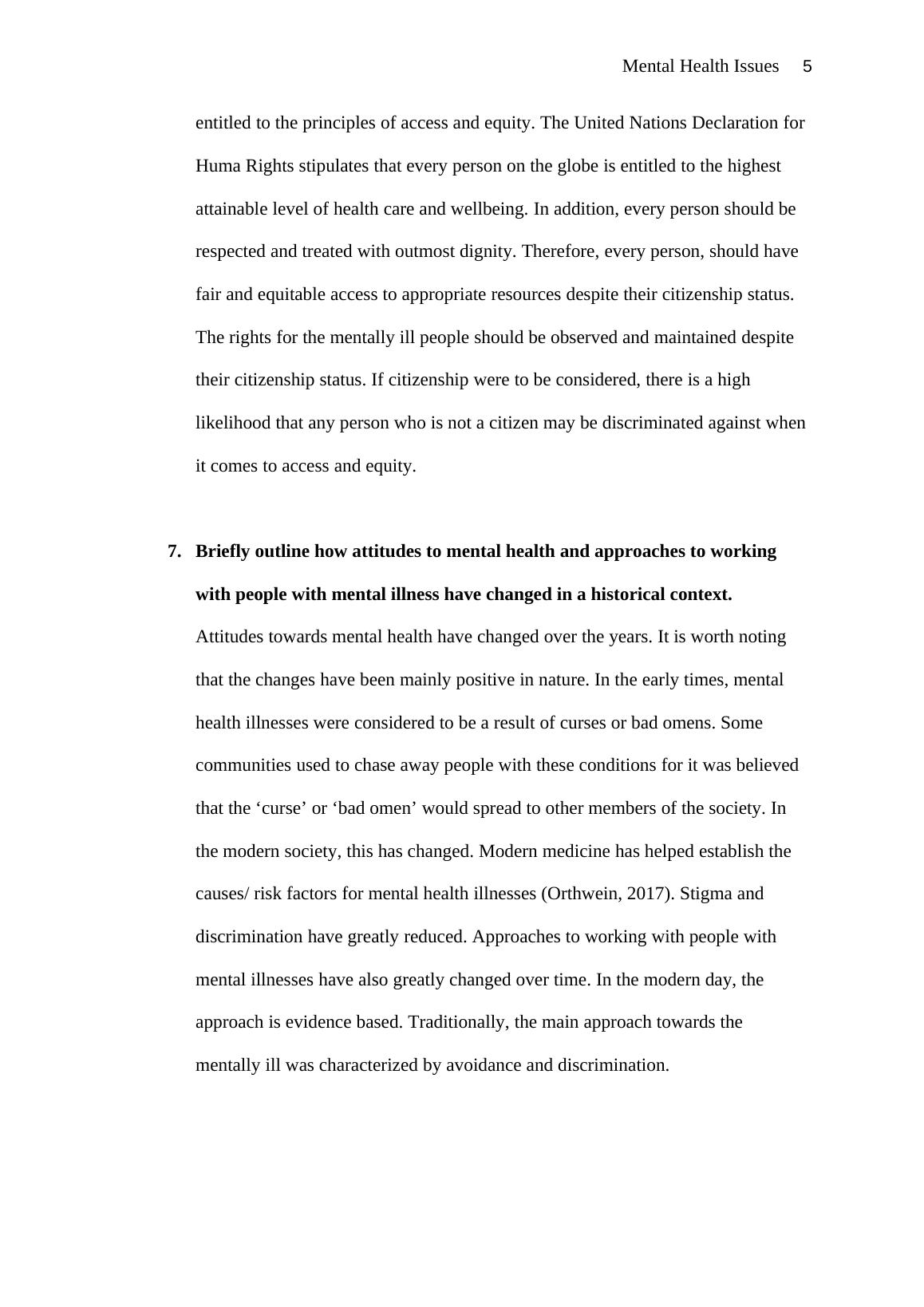
Mental Health Issues 6
8. Briefly outline how societal views of mental health and approaches to
working with people with mental illness have changed in a social context.
Traditionally, persons with mental illnesses were socially excluded (Hunter,
Weber, Shattell and Harris, 2015). In most societies of the world, mental illness
was generally viewed as some kind of a disease that transformed a person so that
they had animal like characteristics. This explains why they were avoided and
treated as if they do not belong to the society. There were certain factors that
influenced this notion. The main one was that most people with mental illnesses
tended to be aggressive and engaged in behaviours that could be regarded as
irrational. In the modern society, things have changed for the better. People are
more welcoming towards people with mental health needs. Although,
discrimination and stigma are still prevalent, they are greatly reduced when
compared to the earlier societies.
9. Explain how government policies and initiatives affect the mental health
sector. Give an example with your answer.
It is the role of the government to ensure that all citizens have access to health
care. Mental health is an important part of health care and wellbeing. Most
modern governments have embraced appropriate policies to improve mental
health in their countries (Baum, 2016). Government policies and initiative
immensely affect the mental health sector. If there are no policies in place
concerning mental health, then the sector is usually neglected and persons who are
mentally ill suffer. When favourable policies are made and implemented, then the
status of mental health improves. Here is an example to show how government
policies and initiatives affect mental health. The Australian government has
8. Briefly outline how societal views of mental health and approaches to
working with people with mental illness have changed in a social context.
Traditionally, persons with mental illnesses were socially excluded (Hunter,
Weber, Shattell and Harris, 2015). In most societies of the world, mental illness
was generally viewed as some kind of a disease that transformed a person so that
they had animal like characteristics. This explains why they were avoided and
treated as if they do not belong to the society. There were certain factors that
influenced this notion. The main one was that most people with mental illnesses
tended to be aggressive and engaged in behaviours that could be regarded as
irrational. In the modern society, things have changed for the better. People are
more welcoming towards people with mental health needs. Although,
discrimination and stigma are still prevalent, they are greatly reduced when
compared to the earlier societies.
9. Explain how government policies and initiatives affect the mental health
sector. Give an example with your answer.
It is the role of the government to ensure that all citizens have access to health
care. Mental health is an important part of health care and wellbeing. Most
modern governments have embraced appropriate policies to improve mental
health in their countries (Baum, 2016). Government policies and initiative
immensely affect the mental health sector. If there are no policies in place
concerning mental health, then the sector is usually neglected and persons who are
mentally ill suffer. When favourable policies are made and implemented, then the
status of mental health improves. Here is an example to show how government
policies and initiatives affect mental health. The Australian government has
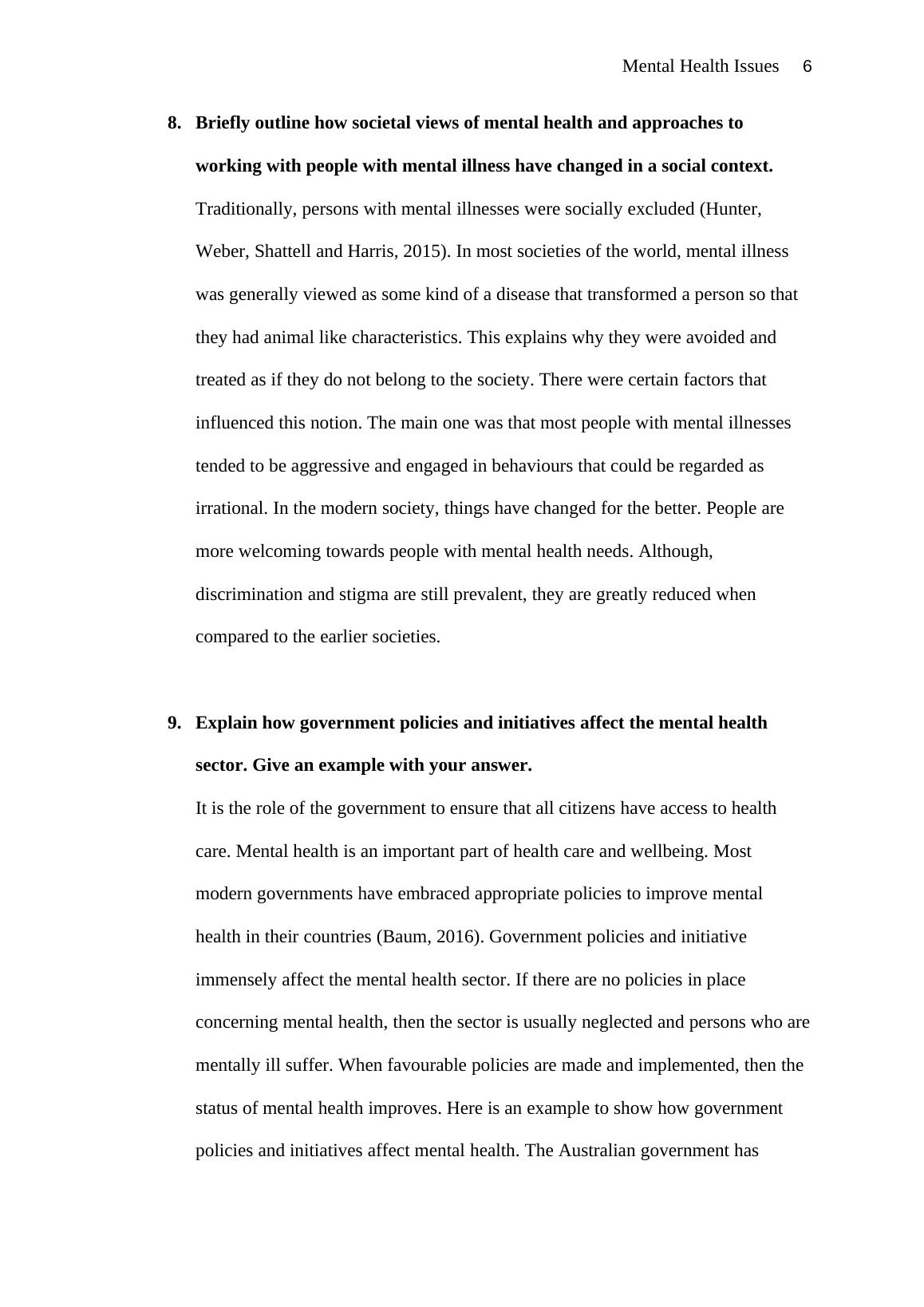
End of preview
Want to access all the pages? Upload your documents or become a member.
Related Documents
Mental health in the communitylg...
|5
|1172
|51
An Analysis of Case Study on Equality and Diversity in the Nursing Professionlg...
|7
|2308
|44
NURS11163 Recovery Approach to Mental Healthlg...
|9
|2303
|43
Mental Health in an Organizationlg...
|11
|1544
|327
Emerging Best Practices in Mental Health Recoverylg...
|8
|2367
|21
Stigma and Mental Illness | Essaylg...
|5
|1006
|21
